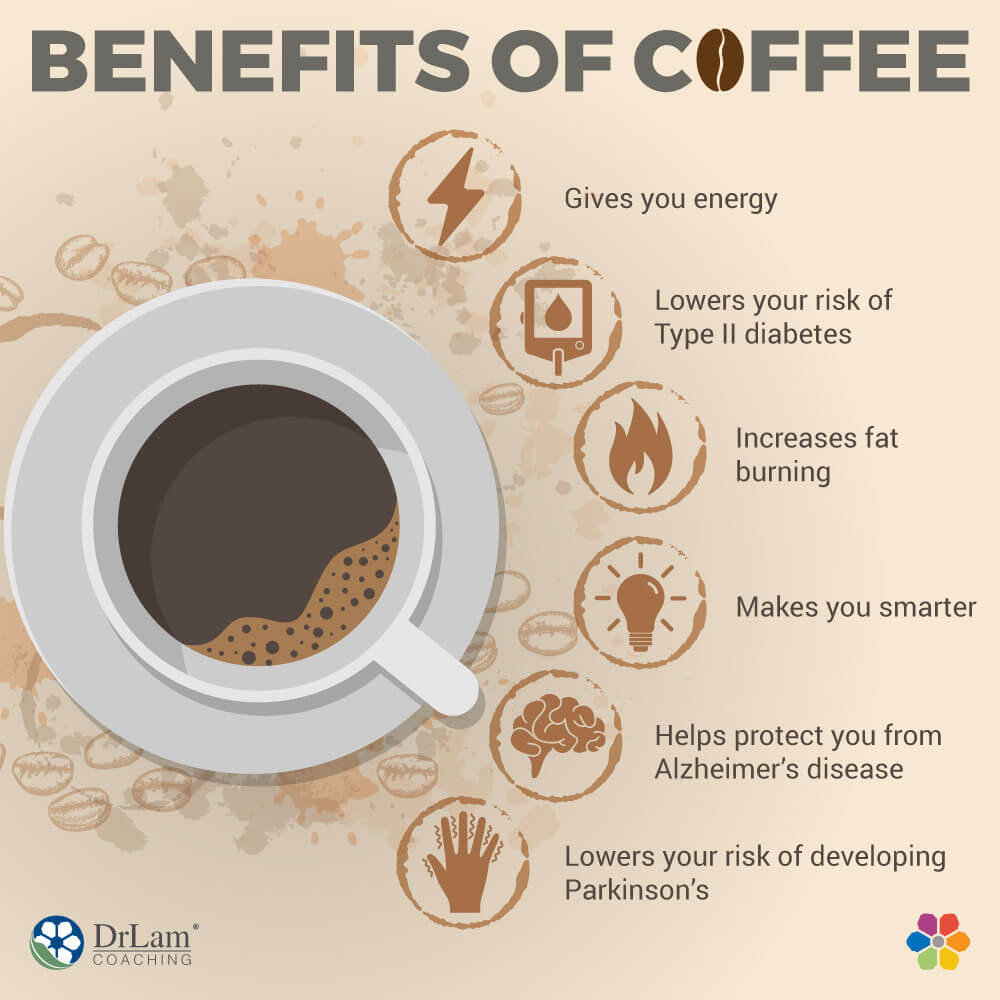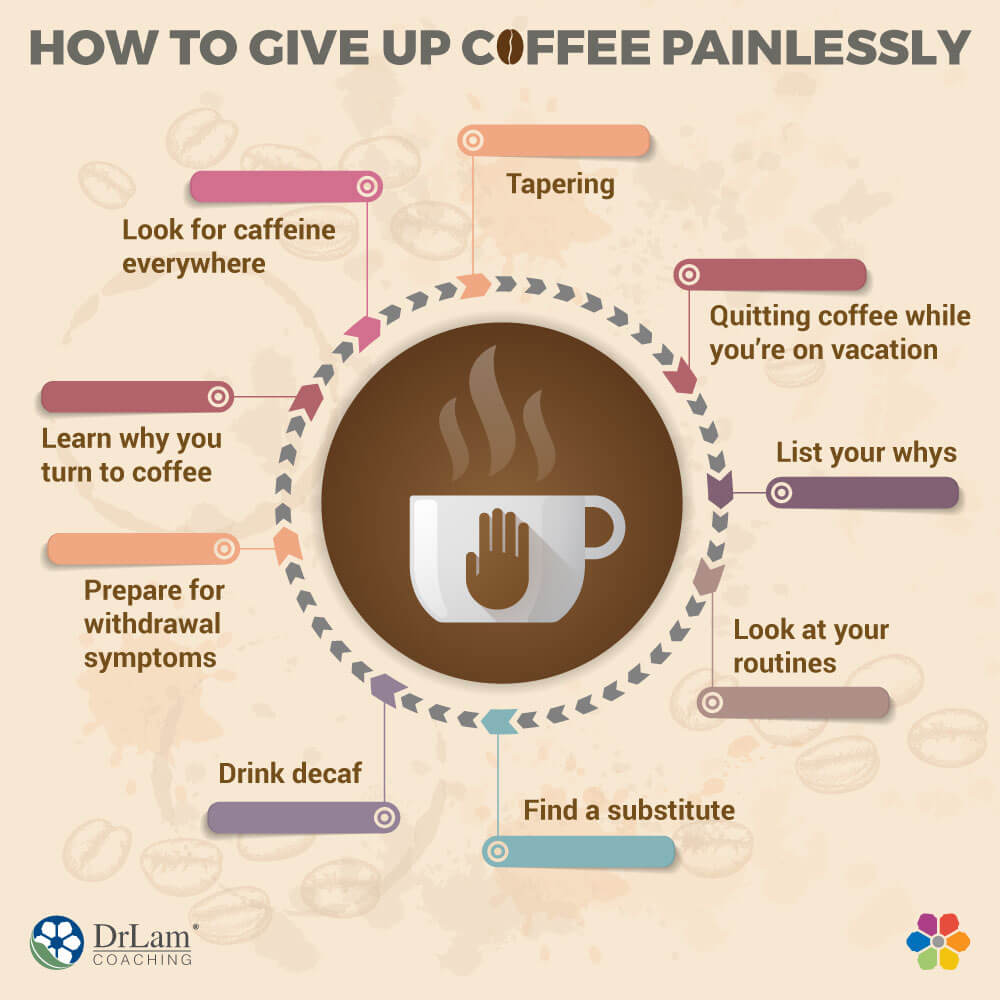There’s nothing quite like that first mouthful of coffee in the morning, is there? The taste, the smell, and the bolt of energy, right when you need it most. Like most things in life, coffee can be both good and bad for your health. A little can be healthy, but a lot can be outright dangerous. Your coffee intake could be involved in your afternoon slump, late-night insomnia, anxiety, and even irritable bowel issues. If you've decided it's time, here's how to give up coffee.
 If you are going to give up coffee, you might suspect some of these hazards already.
If you are going to give up coffee, you might suspect some of these hazards already.
Now, coffee is not all bad. drinking small amounts of coffee can:
However, it’s all about the amount you drink and how your body responds to that amount. Generally speaking, most adults can handle up to 400 milligrams of caffeine a day. This is roughly equivalent to 4 cups of coffee. But drinking less than this amount doesn’t necessarily mean that coffee won't cause problems for you.
There’s a lot of variation in how strong a cup of coffee can be, and in how your body responds to it. You may enjoy a really strong coffee, in which case just one cup could contain a day's worth of caffeine. There are also individual differences. Some people are much more sensitive to coffee than others due to genetic variance in caffeine metabolism. You will have to judge for yourself when is too much.
According to the Mayo Clinic, some of the side effects of coffee include:
If you experience any of these, it might be time to quit coffee. And if you find that you experience late-night jitters or afternoon energy crashes, then it’s worth seeing if your caffeine intake may be to blame.

Coffee doesn’t just taste good at the beginning of a long day. The caffeine in it is actually addictive. Quitting coffee can leave you with withdrawal symptoms such as:
A few days of these symptoms can leave you reaching for your coffee pot again. That’s why you need to learn how to give up coffee gradually, to avoid experiencing side effects that drive you back to it.
There are lots of strategies you can try when you’re learning how to give up coffee without severe side effects. Some of the most effective are:
 With tapering, you give up coffee a little at a time. For a week, you might stop drinking coffee after a certain time each time and make that time earlier as the weeks go on. Or drink one cup less than usual for a week, and then drop another cup next week. After some time, you’ll only have one cup of coffee in the morning and you can decide whether to give up caffeine completely or keep drinking your one cup.
With tapering, you give up coffee a little at a time. For a week, you might stop drinking coffee after a certain time each time and make that time earlier as the weeks go on. Or drink one cup less than usual for a week, and then drop another cup next week. After some time, you’ll only have one cup of coffee in the morning and you can decide whether to give up caffeine completely or keep drinking your one cup.
Drinking green tea, which is less caffeinated than coffee, is also a good way to gradually lower your caffeine dose. Just switch one cup of coffee for one cup of mildly caffeinated tea, and then drink coffee as usual through the day, gradually reducing your dose over a period of a few weeks.
You will lose motivation for quitting coffee, particularly at the times of day when you usually sit down with a cup. Prepare for these times by writing a list of the benefits you hope to enjoy from quitting caffeine. Reading it during caffeine cravings will give you a shot of motivation when you need it most.
Chances are that you drink coffee as part of your workday routine. This means you will have triggers throughout your workday that prompt you to drink a cup of coffee. These triggers can be difficult to change. But you can avoid them completely by quitting coffee while you’re on vacation. This will allow you to go caffeine-free and see how it feels before you head back into the routine that supports your coffee habit.
If you aren’t a heavy coffee drinker but still find it difficult to give up caffeine, then you need to look at your routines. Often, it’s the habits surrounding a behavior that is the problem.
For instance, you might drink coffee whenever you go into the office kitchen because it’s there and freshly brewed. By identifying what triggers your coffee drinking, you can replace or avoid those triggers. For instance, you could avoid the office kitchen at peak coffee brewing times or walk in there with a fresh drink (not coffee) already in hand, so you aren’t tempted.
If you still want a hot drink, then try tea. There are lots of varieties of tea available and some of them are really good alternatives. Just be aware that some teas contain caffeine, though not as much as coffee, and be careful what type you choose if you want to go caffeine-free.
You could also try smoothies, juices, or other substitutes that give you energy in a healthier way.
If you enjoy the warm drink and the taste of coffee, then try substituting your coffee with decaf. This is a fast and easy way to cut down on your caffeine intake.
One of the most effective techniques, when you’re learning how to give up coffee, is to look at why you need it. Do you get tired throughout the day? Do you use coffee to cover hunger pains? If you’re struggling to give up caffeine, then you could be using it to cover up another issue. Instead, work out what that issue is and try to address it directly. Depending on your individual situation this could mean:
If you think that you’re using coffee to cover up negative symptoms, then try some of these ideas and see if they help reduce or eliminate the symptoms more directly.
Sometimes, there’s nothing you can do to avoid discomfort when you’re quitting something unhealthy. All you can do is prepare to face the symptoms and get through them. To this end, make sure you’re prepared for the withdrawal symptoms. The headache is the big problem here because it will lead to irritability and mental fogginess. So, make sure you’re prepared for headaches with:
Also, do note that gradually tapering off your dose of caffeine is a good way to avoid many of the withdrawal symptoms. See "Tapering" above for more ideas.
If you’re having trouble with caffeine, then you may be ingesting more than you think. There are lots of foods that contain caffeine. This means you could be getting a lot more caffeine than the recommended daily amount from other sources. Look out for caffeine in:
If you’re trying to cut out caffeine, you may need to eliminate these sources as well.

Many people with Adrenal Fatigue Syndrome (AFS) use coffee to help manage the fatigue and mental fogginess that comes with this disorder. This may seem like the ideal strategy. After all, when your energy drops, it’s quicker and easier to boost it up with a cup of coffee than to face your daily life without any energy. However, this strategy will only cause difficulties and more problems in the long run. Your body is crying out to you if you are feeling fatigued and mental fogginess. Coffee is only a magic bullet that is helping you from day to day, but it does not get down to the root cause of why your body is feeling fatigued.
Stress caused by issues like relationship problems, work pressures, and poor health is the primary cause of AFS. In the human body, stress is typically resolved by the NeuroEndoMetablic (NEM) stress response. The NEM stress response causes the release of cortisol from the adrenals. Cortisol changes how the body’s circuits function, helping prepare them to respond to the cause of the stress and protecting them from damage. However, the body’s circuits aren’t meant to be in this state over the long term. When stress becomes chronic, the adrenals start to fatigue from the unnaturally high demand for cortisol. And the circuits start to become unbalanced and malfunction because they can’t return to their natural, unstressed state.
Adrenal fatigue and circuit imbalances can result in a wide variety of different symptoms including fatigue and mental fog. It can be tempting to cover up these symptoms with a cup of coffee, but this won’t help in the long term. Instead, it will cause additional stress, putting more pressure on the adrenals. Drinking coffee instead of addressing the problems will also obscure the underlying malfunctions, allowing them to continue and for more damage to occur. And because AFS is strongly linked to food sensitivities, you may experience more side effects or caffeine sensitivities, which will only make all of these issues worse.
Simply put, AFS is a condition where your body begins to develop problems because you are pushing it too hard. You are pushing it into a state of "constant on" to handle stress. But your body needs to be "off" sometimes too, to do important things like sleep, rest, digest, and repair damaged cells. And coffee only adds to the "constant on". Worse, AFS makes your body sensitive to sudden changes, like giving up coffee, so if you have AFS, it's best to talk with an AFS aware medical practitioner so you don't make sudden changes your body can't handle.
 Caffeine can be a delicious and healthy treat, or it can be a crutch that you can’t get through the day without. If you’re drinking too much coffee, or enough to threaten your health, then it’s time to look at how to give up coffee without adding to your stress levels. Some of the easiest and most effective tricks are:
Caffeine can be a delicious and healthy treat, or it can be a crutch that you can’t get through the day without. If you’re drinking too much coffee, or enough to threaten your health, then it’s time to look at how to give up coffee without adding to your stress levels. Some of the easiest and most effective tricks are:
For help with your coffee intake or any other part of your diet, click here to use our Ask the Doctor system, or call our office at +1 (626) 571-1234 for a free initial consultation.
Coffee does have health benefits in small doses but can also be dangerous if overused. If you’re wondering how to give up coffee, then here are the best and painless strategies to help you quit the caffeine without losing your mind.
